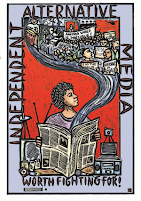For this EOTO project, I researched Alternative Media. Alternative Media, sometimes referred to as Underground Media, is media that isn’t under the control of a higher power such as a business operation or government agency. It involves more traditional media such as newspapers as well as newer media like websites and podcasts. Alternative Media gets its name by being an alternative to Mainstream Media due to the bias often found in Mainstream Media as well as Mainstream Media outlets often being unable or unwilling to offer the alternate opinions that are found in Alternative Media.
Alternative Media has existed for centuries but hadn’t become a specific form of media until the 20th century due to social unrest starting to become much more common. The media first started as printed publications before growing to include radio, television broadcasts, and even low-budget movies around the 1960s. With the growing popularity of the internet, Alternative Media would start to appear online through websites. The internet led to a massive increase in Alternative Media outlets due to how easy it was for people to create their own websites and blogs, allowing more independent writers to get their opinions out into the world.
Most of the time, Alternative Media publications and outlets start out fairly small which forces them to use more affordable methods of distribution such as blogs and newspapers. This often affects the quality of the work they're able to put out. As these publications grow their viewer base, the quality of their work improves. It also allows them to use more expensive distribution methods letting them put out more work faster, plus they can afford to use the more expensive forms of the media like short films.
Despite the various kinds of Alternative Media, it remains much more hidden and hard to find compared to Mainstream Media. There's a reason it's called Mainstream, as often all you need to do is turn on a television or head to a news aggregator to see news from Mainstream news outlets and publications. Why is it that Alternative Media is so hard to find? Often, Alternative Media companies are much smaller in comparison to Mainstream Media, which leads to Alternative Media companies having way fewer resources to not only expand but also advertise themselves. However, one of the main reasons Alternative Media isn't mainstream is because of how specific they are. Mainstream Media is mainstream because it covers news of all kinds. Alternative Media on the other hand tends to produce content that is made for very specific groups of people. For example, some produce mostly conservative content, while others produce mostly liberal content. This forces Alternative Media outlets to remain small because they only cover a specific niche thus leading to their audience being niche. Alternative Media also doesn't really have any television presence at all. This is why there was an explosion of Alternative Media when the internet came around thanks to how easy and affordable websites were.









